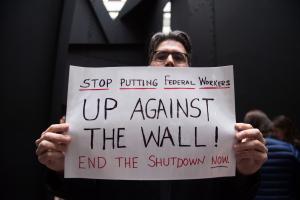Jan. 24 (UPI) — The Senate will vote on two opposing bills Thursday seeking to reopen the government, but it’s uncertain whether either will garner the necessary votes.
Senate Republican leader Mitch McConnell and Senate Democratic leader Charles Schumer reached an agreement Tuesday to vote on the two bills, one of which seeks to end the impasse at the center of the shutdown by providing $5.7 billion in funding for a physical barrier at the border in exchange for protection for some undocumented immigrants. The other offers temporary funding to open the government while the debate on the issue continues.
The two measures amend the Supplemental Appropriations Act of 2019, which would provide funding to a quarter of government agencies that have been closed during the shutdown and return approximately 800,000 federal employees to paid work. The bill was passed by the Democrat-controlled House on Jan. 16, by a vote of 237-187.
The Senate will first vote on McConnell’s bill to fully fund the government through the end of the fiscal year. If it fails, the chamber will vote on Schumer’s stop-gap funding bill.
McConnell’s bill
McConnell introduced a bill based on President Donald Trump’s proposal to reopen the government by offering protections for about 1 million undocumented immigrants in exchange for funds for the border wall.
“The Senate will vote on the plan put forward by President Trump to reopen the closed portions of the federal government right away, increase security on our southern border, deliver disaster recovery funding and address some outstanding immigration issues,” McConnell said.
The bill would fund the government through the end of the fiscal year on Sept. 30 and provide $12.7 billion in hurricane and wildfire disaster relief. It would also extend the Violence Against Women Act, which expired at the start of the shutdown, through Sept. 30.
In an attempt to compromise with Democrats, the bill also includes a three-year delay on Trump’s efforts to end protection for 700,000 beneficiaries of the Deferred Action for Childhood Arrivals program and 310,000 Temporary Protected Status holders.
In exchange, the bill would provide $5.7 million in funding along 215 miles of the 1,954-mile border between the U.S. and Mexico, in addition to $800 million for urgent humanitarian assistance, $805 million for drug detection technology, 2,750 new border agents and 75 new immigration judges.
The bill also includes changes to U.S. asylum rules requiring children younger than 18 from Honduras, El Salvador and Guatemala to apply for asylum from their home countries, rather than at the U.S. border. It also sets a cap for children able to qualify each year for the asylum program at 15,000.
Schumer’s bill
Schumer described his proposed bill as “essentially identical” to the one passed by the House earlier this month.
“The president’s proposal demands a wall and radical legal immigration changes in exchange for opening up the government,” Schumer said. “The second vote demands nothing in exchange for opening up the government.”
The bill would provide funding to reopen the affected government agencies for three weeks, until Feb. 8, in order to provide Congress time to debate border security issues. It also provides $14 billion in unrelated disaster-relief funding for hurricanes, wildfires and other incidents.
Schumer’s bill doesn’t earmark any additional funding for border security, either in the form of a barrier or additional agents, judges and technology. It also doesn’t directly address the DACA or Temporary Protected Status programs, although both are likely to remain in place for at least several months due to existing orders by federal judges.
Ultimately, there were no immigration-related procedures in Schumer’s bill at all, leaving asylum rules unchanged.
Will either bill pass?
Either measure would require 60 votes to pass the Senate, where Republicans control 53 seats to Democrats’ 47. Most experts and observers think passage for either is unlikely.
McConnell hailed the president’s proposal as a “bold, comprehensive offer,” adding it’s “the only proposal that can be signed by the president and immediately reopen the government.”
“Enough political spite. Enough showboating for ‘the Resistance.’ The President has produced a fair compromise that pairs full-year government funding with immigration policy priorities from both sides. It’s time to make a deal,” McConnell wrote on Twitter Wednesday.
Democrats, however have held firm in their resolve to oppose any deal that funds a border wall. If McConnell’s bill was passed by the Senate, it would have to survive another vote in the Democrat-controlled House.
On the Senate floor Wednesday, Schumer said McConnell’s proposal was going “nowhere fast” and was not made in good faith, as he was responsible for eliminating the programs he offered to extend.
“The president single-handedly canceled DACA and TPS protections,” Schumer said. “Now offering some temporary protections in exchange for the wall is not a compromise, it’s more hostage taking.”
Some Republicans have expressed support for a stopgap bill to reopen the government, but if Schumer’s proposal succeeded it would still require a signature from Trump, who has been adamant he won’t approve any bill without funding for the wall.
“Without a Wall our Country can never have Border or National Security,” Trump tweeted Tuesday. “With a powerful Wall or Steel Barrier, Crime Rates (and Drugs) will go substantially down all over the U.S. The Dems know this but want to play political games. Must finally be done correctly. No Cave!”

COMMENTS
Please let us know if you're having issues with commenting.